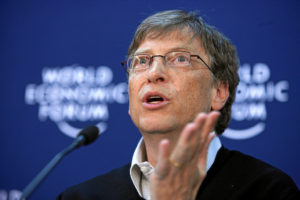The Greening of Bill Gates
While some form of nontheism is a necessary condition of humanism, it isn’t sufficient. And for a long time Bill Gates’s putative nontheistic personal philosophy hasn’t seemed sufficient in the light of a number of his business and employment practices during the time he was at the helm of Microsoft.
For those not keeping track, in its 2006 annual report, Microsoft acknowledged it had been sued for patent infringement in at least thirty-five cases, resulting in over $4 billion paid out to the litigating parties that year, plus $300 million in its own legal fees. But one doesn’t have to be so blatant to get the same result. Microsoft has also been criticized for using a strategy of “embrace, extend, and extinguish” wherein it would embrace open standards, extend them with proprietary features of its own, and then use its market dominance to turn these add-ons into necessities that would effectively extinguish market interest in the original open standards alone.
On the labor front there have been claims that Microsoft is run like a “velvet sweatshop,” wherein the company provides unique and comfortable perks but all within a larger context of overworking its staff. And back in 1992 Microsoft was sued by 8,558 current and former “permatemp” employees who claimed that while they had worked beside their more privileged counterparts, they had been denied medical and other benefits because they were technically temporary workers. Microsoft settled that case in 2005, paying $93 million.
These are just a few examples, making it no surprise that there’s an entire lengthy article on Wikipedia entitled “Criticism of Microsoft.”
In the year 2000, however, Gates (who cofounded Microsoft with Paul Allen in 1975) stepped down as the company’s chief executive, and in 2014 he stepped down as chairman of the board. By thus easing himself out, the sixty-one-year-old software magnate and multibillionaire has gained time to read a book a week, become more contemplative, increase his philanthropic activities, and generally expand his sense of understanding and empathy. Beyond this, Gates has gradually become a public guru, dispensing his hard-won wisdom as free advice and encouraging people to have bigger dreams and become forces for good in the world.
Most recently, on May 15, in fourteen tweets, Gates gave a commencement address of sorts to new graduates. In it he acknowledged that getting a grasp of inequality took him “decades.” And he set forth his new view: that because the world is steadily getting better, it’s worthwhile to spread progress to more places. As the basis for his optimistic conclusion, he cited Steven Pinker’s 2011 book, The Better Angels of Our Nature: Why Violence Has Declined, stating, “If I could give each of you a graduation present, it would be this—the most inspiring book I’ve ever read.” It is in this book that the American Humanist Association’s 2006 Humanist of the Year makes his case that per-capita violence has long been on the decline.
Pinker’s book tops a list of twenty-eight Gates recommendations that include other mind-broadening titles like The Sixth Extinction: an Unnatural History by Elizabeth Kolbert and The Myth of the Strong Leader: Political Leadership in the Modern Age by Archie Brown.
This is all to say that it’s getting easier for socially conscious people, like humanists, to admire Bill Gates. Moreover, the philanthropy of Bill and Melinda Gates is phenomenal. In 2010 they initiated the Gates-Buffet Giving Pledge wherein billionaires Bill Gates, Warren Buffett, and Mark Zuckerberg committed themselves over time to donating to charity at least half of their wealth. And the Gates Foundation’s work to enhance healthcare, education, and access to information technology and to reduce the most extreme levels of poverty around the world are undoubtedly praiseworthy.
Does this mean it’s time to recognize the man’s transformation with a humanist award? Perhaps, but waiting a little longer might be in order. Does this mean humanist organizations can look forward to big financial contributions from one of the richest men in the world? Don’t hold your breath: Gates gives to development work, not the dissemination of ideas. Donors are particular in the sorts of nonprofits they support, and this is a fact of life for fundraisers.
But it does mean that there’s one additional famous secular individual who is using his fame to generate beneficial intellectual and social effects that are neither micro nor soft. For that we can be grateful.

